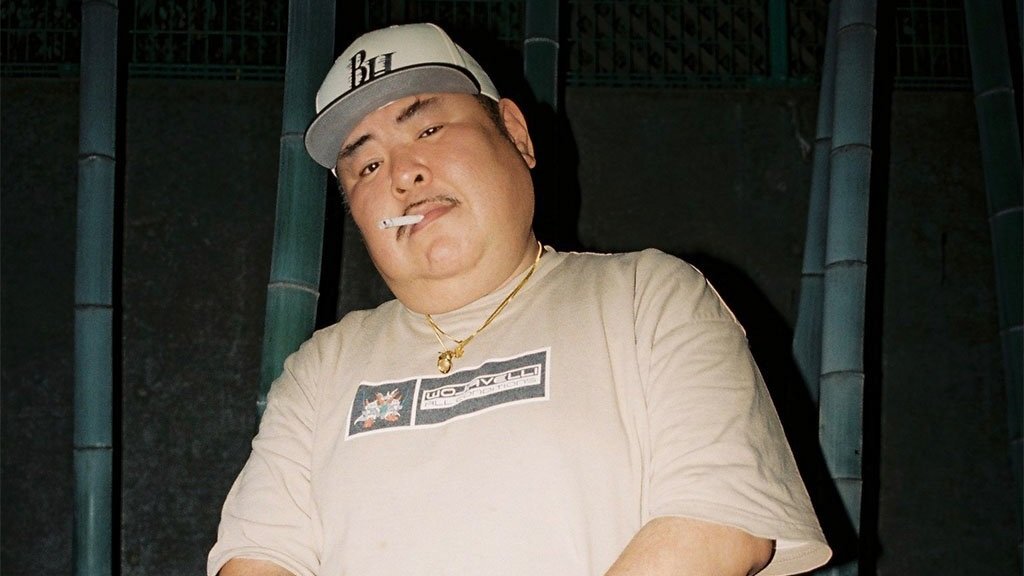30 Years of DJing in Tokyo - Meet DJ Quietstorm

Take a look at Tokyo’s music scene. It might quite possibly be one of the most diverse in the world. Anything from idol J-Pop groups to hardcore punk goes, and it all coexists within one city. There is a venue for every genre, and a fanbase for every artist/group. In recent years, DJing is also becoming just as diverse. Techno, house, hip hop, hardcore, there are DJs today who play almost any genre, and even mix these genres together as well. The music & club scene in Tokyo has always been changing, always evolving, and finding new ways to become more and more interesting.
But 20, 30 years ago, times were different. The underground scene in Japan was much more “strict” than today, and young creatives didn’t have the freedom to mix genres, or play tracks that didn’t fit the vibe of the party or venue they were spinning at. Doing things like this would get you disses, or even worse, you could step on the toes of a scary senpai [someone older than you].
But the scene didn’t just instantly change, and clubs didn’t go from “you can’t play that” to “you can play whatever you want”. There has to be someone, someone who paves the path for the generations to come, breaking boundaries and creating new norms.
There is one DJ in Tokyo that you can’t miss when talking about, well, the entire DJ scene. One who was doing the stuff that would get you dissed back then. One who was paving paths, breaking boundaries, and creating new norms. There aren’t many other cases of staying relevant in the scene for over 30 years. Meet your favorite DJ’s favorite DJ, DJ Quietstorm.
Starting his life off in the US, DJ Quietstorm has been DJing for a total of 36 years now, with 30 of them being here in Tokyo. Not only do his talents lie as a legendary & influential DJ, but he also makes rap, house, and jazz tracks, organizes some of Japan’s most iconic parties, creates clothing, and runs a label.
With an educational background in computer science and graphics, DJ Quietsorm’s story isn’t quite your average DJ’s. But that could be what makes him so diverse, so willing to take the risks to create something never before seen or heard. The parties he hosts are something of another level, like “Tight”, which has been ongoing for 25+ years, and “Living Room”, where the concept of the DJ booth and the dance floor is turned on its head, with the DJ booth placed in the middle of the floor on a sofa/coffee table set, and the crowd surrounding them, breaking down the border between the crowd and artist and resulting in a crazy fresh experience.
He plays at Fujirock Festival, one of Japan’s biggest outdoor music festivals, which he will be playing at this year as well. He’s DJed numerous reception parties, like for Bally alongside Swizz Beats and Nas, or at Kaikaikiki Gallery for Madsaki’s show. In 2018, he even connected a dozen legendary street artists to collaborate on his 30th anniversary as a DJ at Beams T Harajuku. Today, he continues to add benchmark after benchmark to his long list of career achievements. From doing musical direction for clothing brands to working with Pioneer DJ on the next generation of DJ equipment, today, he continues to add benchmark after benchmark to his long list of career achievements.
sabukaru had the chance to sit down with DJ Quietstorm, and take an exclusive journey down his life, from his childhood days, his early days as a DJ in the States, his influences, and much much more. Check out what he had to say in the exclusive interview below.
Could you start off by introducing yourself to the Sabukaru Network?
I’m DJ Quietstorm, I’ve been DJing for a total of 36 years. I started out in Chicago but I’ve been in Tokyo for 30 Years now. I make rap, house, and jazz tracks, I organize parties, I make some clothes, and I run a label called Nakameguro Yakkyoku [Nakameguro Drug Store]. That’s the simple version.
What was your very first interaction with music?
When I was in like 1st grade the first thing I ever bought with my allowance was a Boz Skaggs 7” at KMart [laughs]. My folks didn't have any interest in music, so they were very surprised that I was so amused by it. I used to put my tape recorder up to the speakers and record songs off the radio. So even when I was like 5 or 6, I was already making mixtapes.
Your educational background doesn’t quite scream “DJ”. Was there a moment or a point in your life where you decided “I want to become a DJ” or did you always want to become a DJ?
I was in Tokyo in high school, I went to an international school, ASIJ, and my basketball coach when I was a freshman had just moved from New York that year and he’d brought some mixtapes. This was like 1983, so it was the very beginning of hip hop. It was more dancey at that time, it was called “electro”, like Afrika Bambaata's “Planet Rock”. But it was all mixed together on these tapes and it blew my mind. During practice, all my teammates and I would listen to that on my coach’s boombox. No one thought anything of it except for me. He’d lend me the tapes and I just couldn't stop listening.
Herbie Hancock’s “Rock It” had also just come out and that song was the first time anyone had really heard scratching. I asked my coach what that sound was and he told me “he’s scratching a record”. So I went home and scratched one of my dad's records with a nail file [laughs]. There was no way to get information, especially all the way over here in Japan so I just assumed they were just picking up that sound with the mic.
Most of all though, the Tokyo nightlife at the time, is what got me. They had discos, there was nothing called the “club” in Tokyo until I was a senior in high school. When I was a sophomore I’d go to the disco and head straight to the DJ booth just to sit there and watch.
You were allowed to go in?
There was no culture of carding anybody here and you could kinda get away with whatever if you didn't know anything. I'm sure I was causing problems all over the place but after seeing DJs really scratching in high school, it was the first thing I did when I went back to Chicago.
The first couple weeks into studying computer science engineering at University of Illinois I saw somebody had 2 turntables and a mixer in brand new condition for sale on some message board. It was some grad student who bought them and then realized he had no time so it was so cheap, like a third of what it would cost.
It was the best deal ever, so I got a job at the cafe until I paid the dude back over like 6 months. I stole a table from the cafeteria at night and put it in my dorm room. So then I became the kid with turntables, when no one had turntables.
You mentioned how the disco scene changed into the club scene in Tokyo. What were some of the clubs you were going to at the time?
The first club I ever got into was called Picasso, it was in Nishi Azabu. I tried getting in there a couple times with my high school buddies but the guards would just say “private party, go away.” They’d turn down anyone who wasn’t cool at the door but I met somebody who said they had been there before, and I was like “Can we go? Can you take me there?”
She introduced me to the owner, Daizo-San. He’s started a bunch of clubs around Tokyo. Even now I meet him when I do my party at his club Contact. They were hella picky about who they let in back then.
It turns out they had a fake door. There was a little metal mesh panel with a light behind it so you couldn’t really see through, but that was the entrance. If it was your first time it just looked like a dead end to the hallway. I started to go there by myself. I didn’t speak Japanese, so I’d just be sitting there watching these fucking crazy parties.
What was the first thing that made you move to Japan? Did you always have an interest in the country?
Because of my dad’s work, every 3 or 4 years we’d move as a kid. It was just one of the places in my destiny I guess, but after college, it was the nightlife.
My folks were pretty strict, they wanted me at home early every night, but I caused a lot of problems and was always getting in trouble, so the thought of being over here with my own apartment, and all the parties… I decided to come back after college, by myself, and see what Tokyo was really like.
I was just “sugoi charai” [player, in jest].
How would you say the music or club scene is different in Tokyo and the US?
It changes so much over here, but for the most part, the first impression is that people in Japan seem to have a deep interest in music. They look like they’re really seriously listening and appreciating, but once you’re here a little longer you realize a lot of it is just nerves. People here aren't used to going crazy and showing themselves, so somebody will come to do a show and it will seem like people are really paying attention which DJs aren’t really used to in the States.
It's been changing a lot since I’ve gotten over here, though. People have gotten a lot looser, they’re figuring out how to party. I think people would go crazy if they knew how to.
Do you remember the very first time you DJed in front of a crowd?
The very first time was right when I got my turntables in my freshman year of college. The black fraternities would throw these crazy huge house parties in the halls on campus. Me and these two other guys who had DJed together in high school, we would use my equipment.
I wanted to play hip hop but in 1987 it still wasn’t very big in Chicago. Similar to the inspirations that started hip hop in New York, all the music that was coming out of the ghetto in Chicago was house. It was more of a disco dance culture but it was very local and underground.
At these parties the fraternity guys would go crazy. It would be like 800 people in these gymnasiums and everybody was black. We told them we’d do their parties for free, and these were big parties. That was the first time I ever DJed in front of people. 800 people who didn’t want to hear hip hop, but eventually, they were into it.
What about your first time DJing in Japan?
Right when I got back over here I got to meet DJ Krush and Yabe Tadashi from UFO and within 6 months I’d been introduced to pretty much everybody. It was a really small community and there weren’t many clubs yet. This DJ called MOODMAN was doing a weekday party at this little place in Nishi Azabu, I don’t even remember what it was called but he said I could bring records and come DJ.
After that, Yabe-san and I started doing a monthly party at this place called 328 right across from where Picasso used to be at the intersection in Nishi Azabu. Then in 1998 DJ Yas, who was DJ Krush’s kaban-mochi [right-hand man], got offered to do a party every Friday at Cave in Shibuya, which is one of Daizo-San's original clubs. Yas asked me if I wanted to do that together, and 24 years later we’re still doing that party.
Who are some DJs that you really look up to?
DJ Krush is the guy I always throw out at this question because he’s just the perfect example of doing your own shit and making your own voice. Really at that time, there was a whole discussion in the hip hop community about if you could call that hip hop if there was no rap. Some people were calling it “trip-hop”.
Krush stuck his neck out to be dissed and not being taken seriously but what he did was so strong, so quality that it made everyone bob their heads and say “yeah, this is hip hop.” He changed the music scene globally. Krush stuck to his own original style he’s had for 30 years, that's what I really respect.
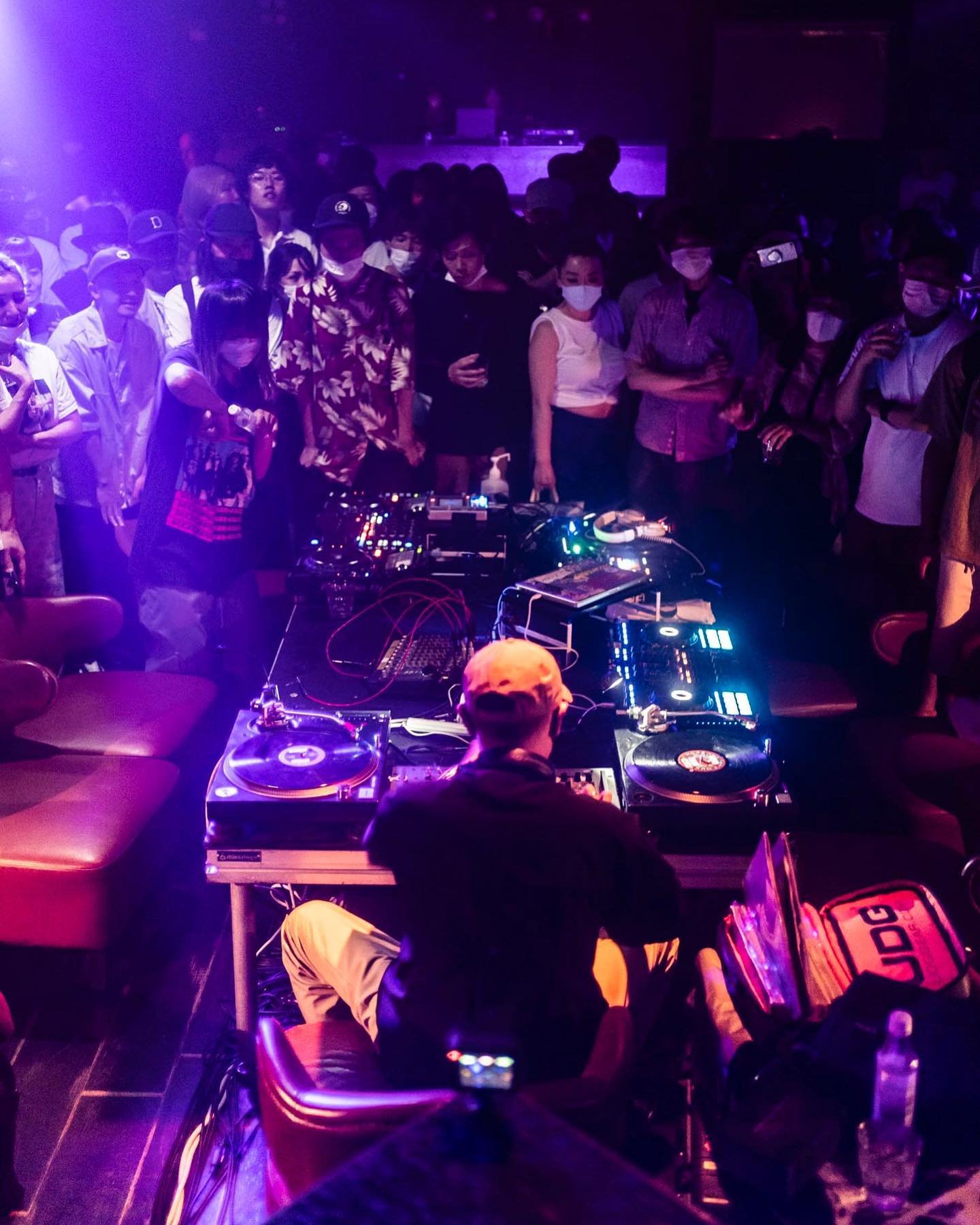
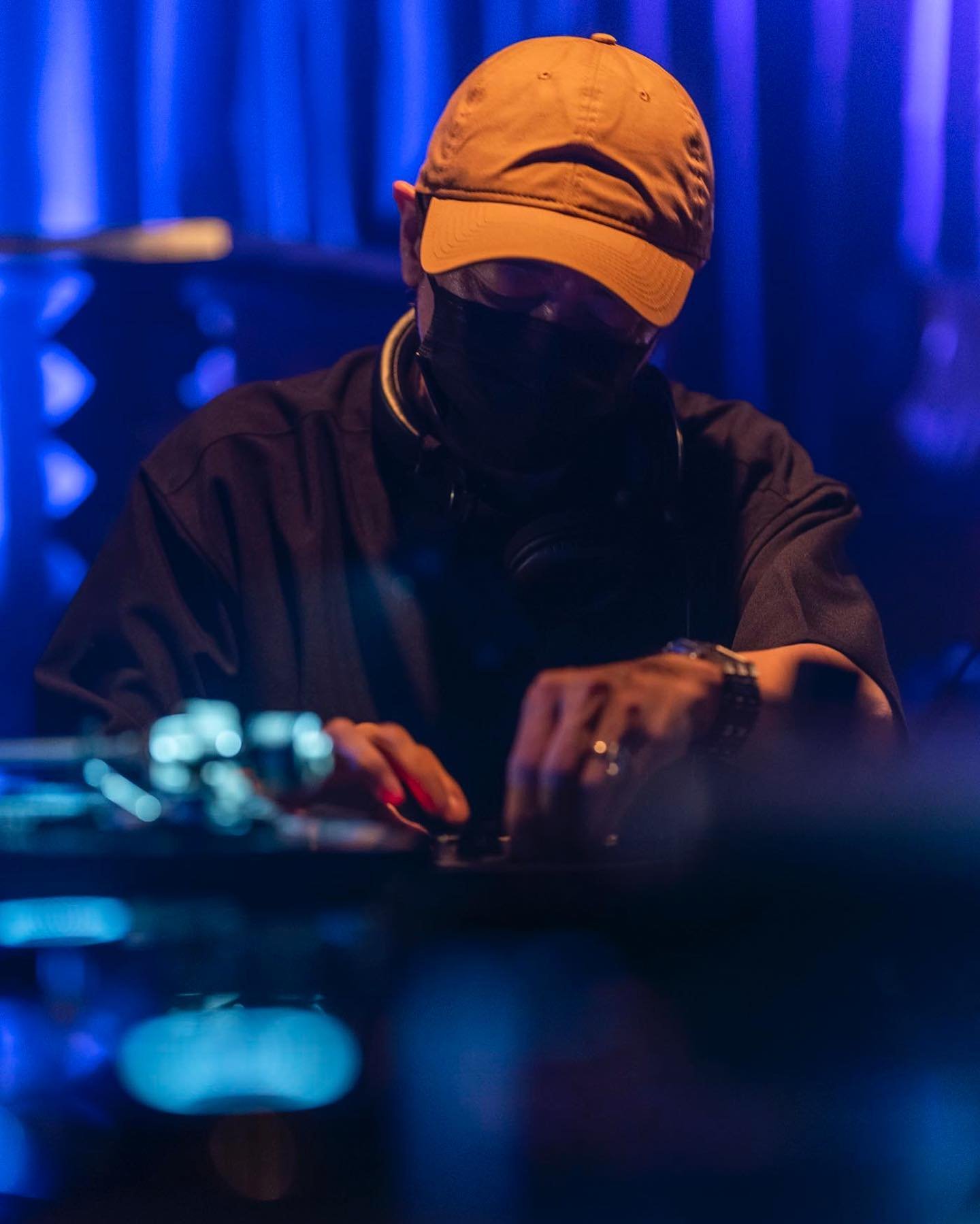
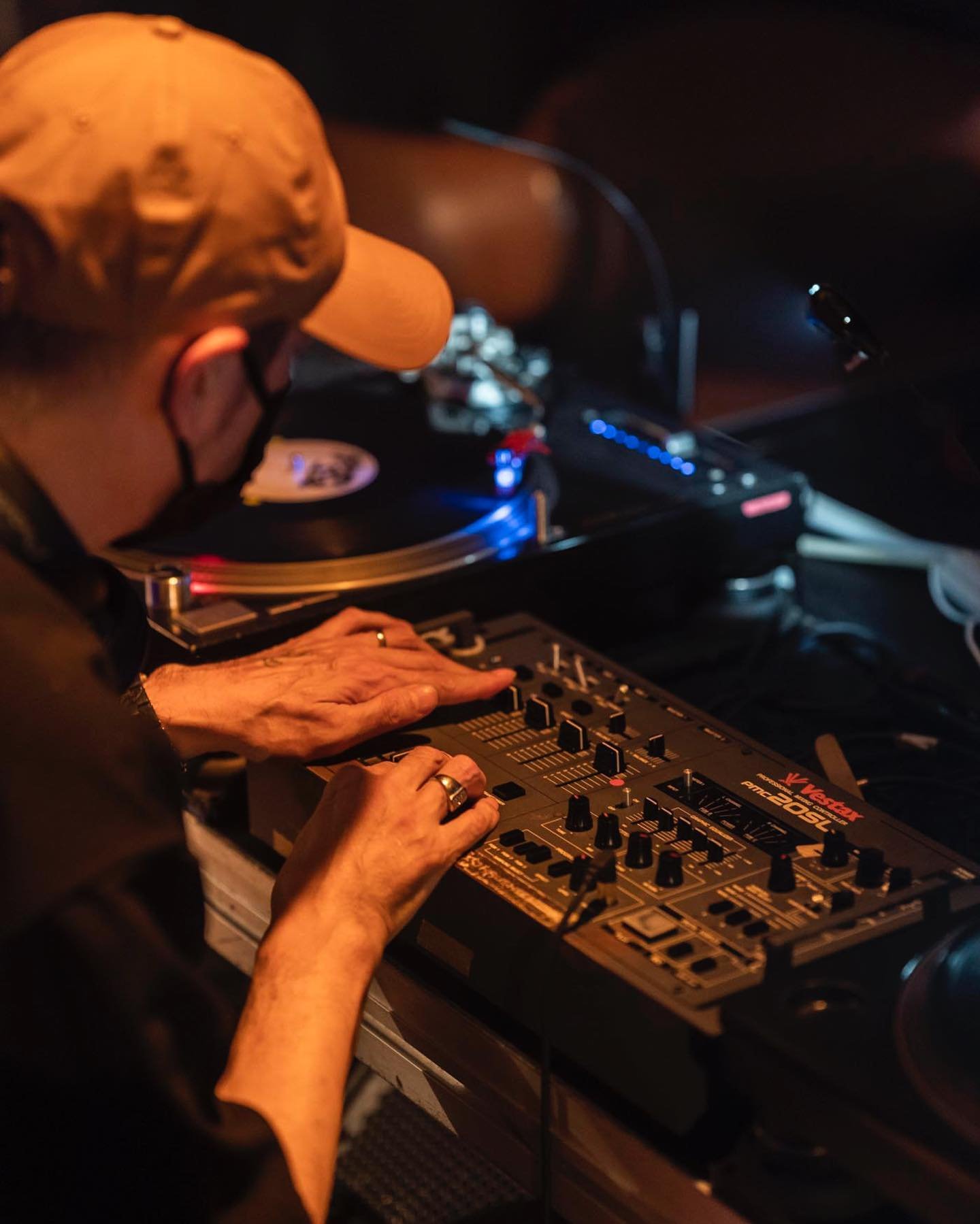
On the other hand, who are some exciting names that we should keep an eye out for today?
I think some of the best music humanity has ever produced was hip hop in the 90s.
The whole basic concept is; you take a loop off of something dope and you add some nice crispy drums and then you rap on top of it. That hadn’t changed since the late 80s. Hip hop started out not sampling but with drum machines and stuff like that, but once samplers got out there, the method of making music changed. It all got more complicated and hip hop broke up into different styles.
When you think about the 70s, there was not a single song that was made of a sample loop with drums and rap on top of it. And then all of a sudden somebody comes up with the idea that this is how we could make music and then everything that comes out is made like that. That lasted through into the 2000s, almost the 10s almost. I can’t think of any other kind of music style that lasted that long. If you think of 50s style rock, in 10 years that was gone and it was 60s style rock, then 70s style rock.
Hip hop really hit a peak and then just stayed there until like 10 years ago when the current rappers came out. They call them mumble rappers but when the beats started getting really dubstep influenced and the South started making that new kind of trap sound I was like “fucking finally there’s some new shit”. Because it was a long time to be listening to it every day for 40 years.
That new sound went all over the world and over here, there are some really world-class Japanese rappers. I don’t know if it works well with Japanese or what. Because, the really tricky lyrical Eminem-type rap, nobody really got on over here. The assumption was just that there were not many skillful rappers in Japan but I think there was some kind of hurdle with the Japanese language. You never really heard a Busta Rhymes style flow in Japanese but now you hear Young Thug or Travis Scott or somebody and put that up against Lex, it’s on the same level. So I think there’s something about the way the current trap/mumble rap is set up that it lends itself to Japanese a lot more than the old boom bap style did.
And I think it’s going to blow up worldwide the way K-Pop has. Even a few years ago it was unthinkable to have a bunch of young Asian dudes getting respect from the Migos and taking a selfie with Cardi B at the Grammys show. I think K-Pop artists like BTS opened up a big door. The next thing is to get Lex or somebody over in the States to do a big arena tour. I know Miyachi did a halftime show for the Clippers. I think this current group of rappers have potential, they have the quality and skills and charm and all of that.
Have you ever faced any difficulty being a foreigner in Japan?
Everyday bro, there are so many levels to it.
The more I understand about the world, the more I realize I didn’t understand anything up until now. Five years in, we think “I know this city, I know everybody here, I can kind of speak Japanese now, I know all the key players in the city, it’s going down” and then 10 years later you look back at that time like “Woah, I didn’t know nothing.”
Over the years here I’ve kind of learned the concept of microagression.
Just little paper cuts that individually don’t hurt that bad but you realize every day for the rest of your life someone’s gonna give you a paper cut. Those microaggressions exist in the States too, it’s not just here. It’s not like cops are going to pull me over and shoot me in Japan, but my pockets have been searched for drugs by police more than 30 or 40 times.
Do you feel that the music scene or club scene is a lot more accepting of people not from Japan?
Oh yes, the people you meet in clubs are obviously a select group of more culturally aware people. The clubs are where I feel most at home. It’s really not until you get outside of Tokyo that you start to really feel the fact that you don’t fit in over here. When you remember that this is not your country, and you’re just a visitor. There’s a bit of that feeling that you live with every day, even after 30 years here.
Is there one person you could credit as being the person who connected you with everybody in that community?
It all starts with that first person, and for me it was Pardon Kimura.
Turns out his older brother was a classmate of DJ KRUSH’s. So when samplers came out, he told DJ Krush about them, and he got him started making music. Krush was on the wrong road for a while but Kimura-san had a big effect on Krush finding his career and staying off the streets.
Kimura-san also introduced me to the band Buffalo Daughter, or Havana Exotica as they were known at the time. Kimura knows everybody. He lives in Shizuoka now, he surfs and teaches music down there. He’s probably 60 now but he’s still active. I saw him in Shibuya a couple of weeks ago.
Most people know you as DJ Quietstorm but you often appear under the alias Kuwata Tsutomu, what’s the difference?
I was in Chicago from ‘87 to ‘92 and all I wanted to do was DJ hip hop but everybody wanted to hear house, so I got all the old-school Chicago house. I maxed out two credit cards at the record store and left the country, still haven’t paid for that shit. So I had a lot of priceless records - all the original Chicago house. I came back over here in ‘92 and that era had a “are you real hip hop or what” kind of attitude and I also wanted to do hip hop. But after 10 or 15 years over here, I was kind of thinking back, so on some of my mixtapes, I’d throw on a Chicago house classic.
So my friend Takamori K was throwing a house party at Yellow and he said “You have house records, you should do a house set, but if I say DJ Quietstorm on the flier it’s going to be hella people that come expecting hip hop. So you gotta come up with a different name.”
So I took my name “Quietstorm” and made kind of a pun in Japanese with it. When you pronounce Quietstorm in Japanese it sounds kinda like you're saying “Kuwata Tsutomu”, which is just a super typical sounding Japanese name, like Mike Smith or something. So I started using that name as a joke when I was spinning house, so people would know not to expect hip hop.
I wanted to come out with classic 80s Chicago house, dark moody underground street shit. That was the concept.
After a few years of doing kinda secret gigs like that, I ended up making a whole album of Chicago-style house tracks and released it under that name through one of the best Japanese house labels, Ene Recordings.
And I did the release party at Unit and had Nori-san and Nobu-san and Moodman, the whole house community came out, it was a huge lineup. And when it was time for Kuwata Tsutomu I came up and people were like “Ahhh! Quieto Sutoomu… Kuwata Tsutomu!” They finally figured it out [laughs].
One of the most iconic events is Living Room at Contact. How did Living Room start?
After the 2011 earthquake, there were a couple years where things were really quiet and the clubs were not popping. The original concept was just, “we need to get out of the house, bro, even on a weekday where we can get out and listen to loud music.” The concept was that we’re still alive; gotta have a place to be.
It started at a really small club called Cave. The way that the place was set up, I DJed on a tatami mat. It went crazy. The first night even, an incredible party. And we did it again and again, but eventually, they went out of business so we only did 3 months there and then moved it to a place called Unice.
We started packing that place and so they started to do more parties there. We had a good 4 or 5 years at Unice. Because it was a cafe and they had all these couches and tables, I had all this freedom to lay out the place the way I wanted to.
We ended up putting the table in the middle of the floor and clearing out a donut shape around it. We’d sit on sofas in the middle of the floor and then people would be around us while we were DJing, the vibe was so cool. Since you’re surrounding the DJ you end up looking at everyone and you can see the DJ from all angles, it creates this emotion, it kind of breaks down the barrier between the DJs and the people. Nobody had seen anything like that at that time.
Eventually, we had to find a new venue and Contact asked us to come, I was like “fuck yeah, a real club.”
Fast forward to now, Living Room is at Contact but they unfortunately just announced they’ll be closing their doors soon. What place does Contact have in your heart?
I think it’s one of the better clubs in Tokyo. The sound system is from Yellow, so it’s got that history. I used to do a party at Yellow 25 years ago, so it’s like that “Tokyo sound” to me. For me to be a part of Daizo-san’s family is such an honor. For 40 years he has been the one guy in Tokyo who never fucks up. Everything he does has been a super hit. If it weren’t for him there wouldn’t have been clubs in Tokyo in the 80s.
You mentioned your project, Nakameguro Yakkyoku. How would you describe it?
When I got over here 30 years ago, I saw everyone wearing New York Yankees caps. Fresh off the plane I thought “where are all the Tokyo caps?” In Chicago everyone reps Chicago hard, if you’re from New York, LA, you rep your city. But nobody’s repping Tokyo. That’s so fucking Japanese, that sort of complex. Like somebody went to New York for a week or two and now they're like “yo, I’m repping New York!” Whatever, man. I came to Tokyo from Chicago and I chose to rep Tokyo so it’s making me look stupid. You just gotta rep where you’re from. I wanted to rep my neighborhood the same way Dr. Dre reps Compton.
Nakameguro was like the center of my universe. 30 years ago Nakameguro was hella different, there were no shops along the river, nobody was showing up to see the cherry blossoms in the spring, it was just a quiet place to live close to Shibuya [laughs].
Would you say it’s a brand?
It’s a music label. All the tapes that I put out are Nakameguro Yakkyoku recordings, but then we started making T-shirts, sweatshirts, hats, and stuff like that. When it first came out, X-Large had just opened up their store in Harajuku and that was the shit. The Beastie Boys were still active in selecting what was there. I got to the manager here and he said he’d talk to them in the States and see if we could get Nakameguro Yakkyoku in the store.
I got a corner in X-Large for the first collection. They sold so many so eventually, I got a contract with a distributor to distribute my clothes for me. It got to be so fucking busy but it was fun while I was doing it. I still do T-shirts, and jackets now I just do it on a direct-to-buyer site.
Moving on to your daily life, you recently had a daughter. Massive congrats. What is your life like now that you’re a father?
Thank you. I do all my work from home so basically, I can do anything I need to. I’m really glad I waited this long in life to have a baby because now I can kind of set the rules for how I work. 20 years ago would have been very different. I’m starting to realize this level of respect that I never had for my friends who had kids. It’s a big undertaking. When she gets a little older it will be fun to be able to bring her out and go places with her.
With a legendary DJ father and a badass stylist mother, how do you want your daughter to grow up?
She’s going to have a lot of culture around her, her education will be very deep, and very diverse. Can’t wait to see the path she chooses. From my own experience, my folks weren’t interested in music or underground subcultures at all. But for me, I was always really pinpoint focused on what I liked so I think it doesn’t really matter as long as we’re here to show her this base of reference of the best, most interesting shit that’s happening in the world. Then she’ll have a broad base to pick from.
What are some go-to Japanese food spots?
Food in Tokyo is so good. Umegaoka Shibasakitei is my current ramen of choice. Get the Kaki Sansho ramen [oyster sichuan]. I don’t know if it’s my all-time favorite ramen but lately, it’s all I’ve wanted to eat. I also have two tonkatsu joints, I’ll tell you one of them. There’s a place in Akihabara called Marugo, it’s so fucking good. Just go and get the most expensive one on the menu. It’s been there since I was in high school. I used to go there with my dad 40 years ago.
Are there any events or releases we can expect soon?
I played at Fuji Rock again this year. I just love going up there in the mountains and seeing all these people that love music. I’m the music director this year for a national clothing store chain. I’m doing an exclusive mixtape once a month that they only play in the shops.
And we’ll be doing our last Living Room at Contact on Tuesday September 6th. I definitely want to keep the party alive so I’m working on finding a new venue for after Contact closes down. Stay tuned!
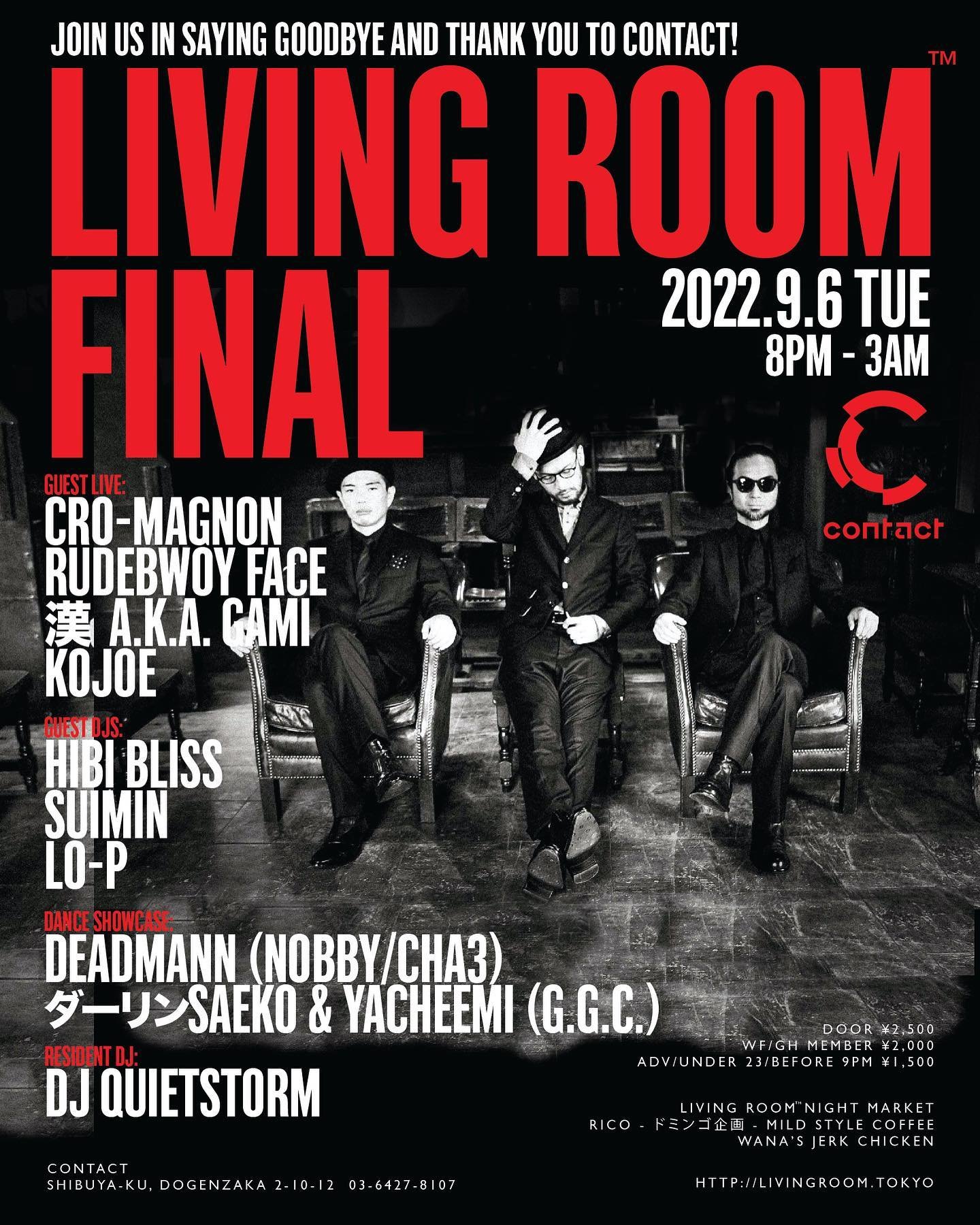
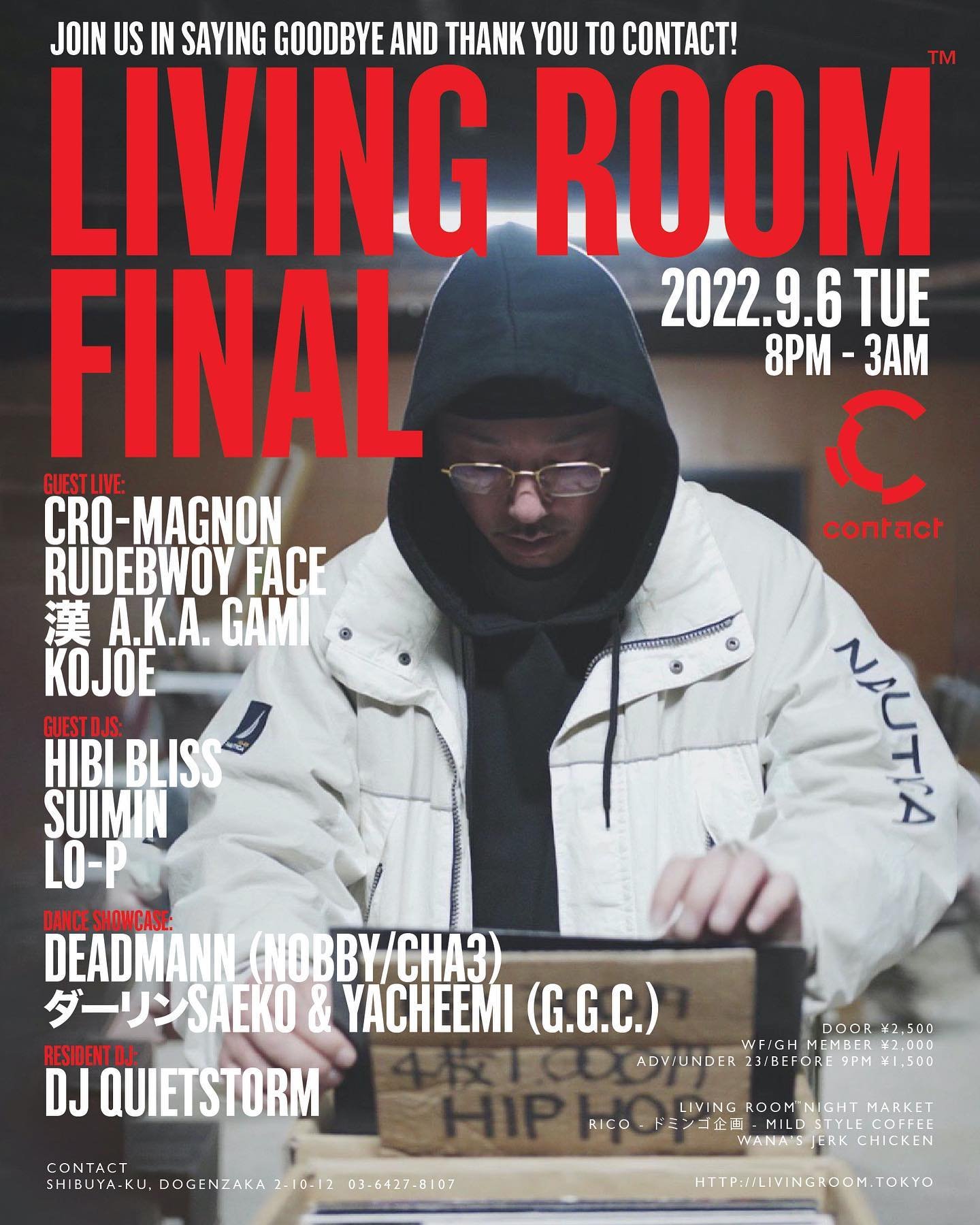
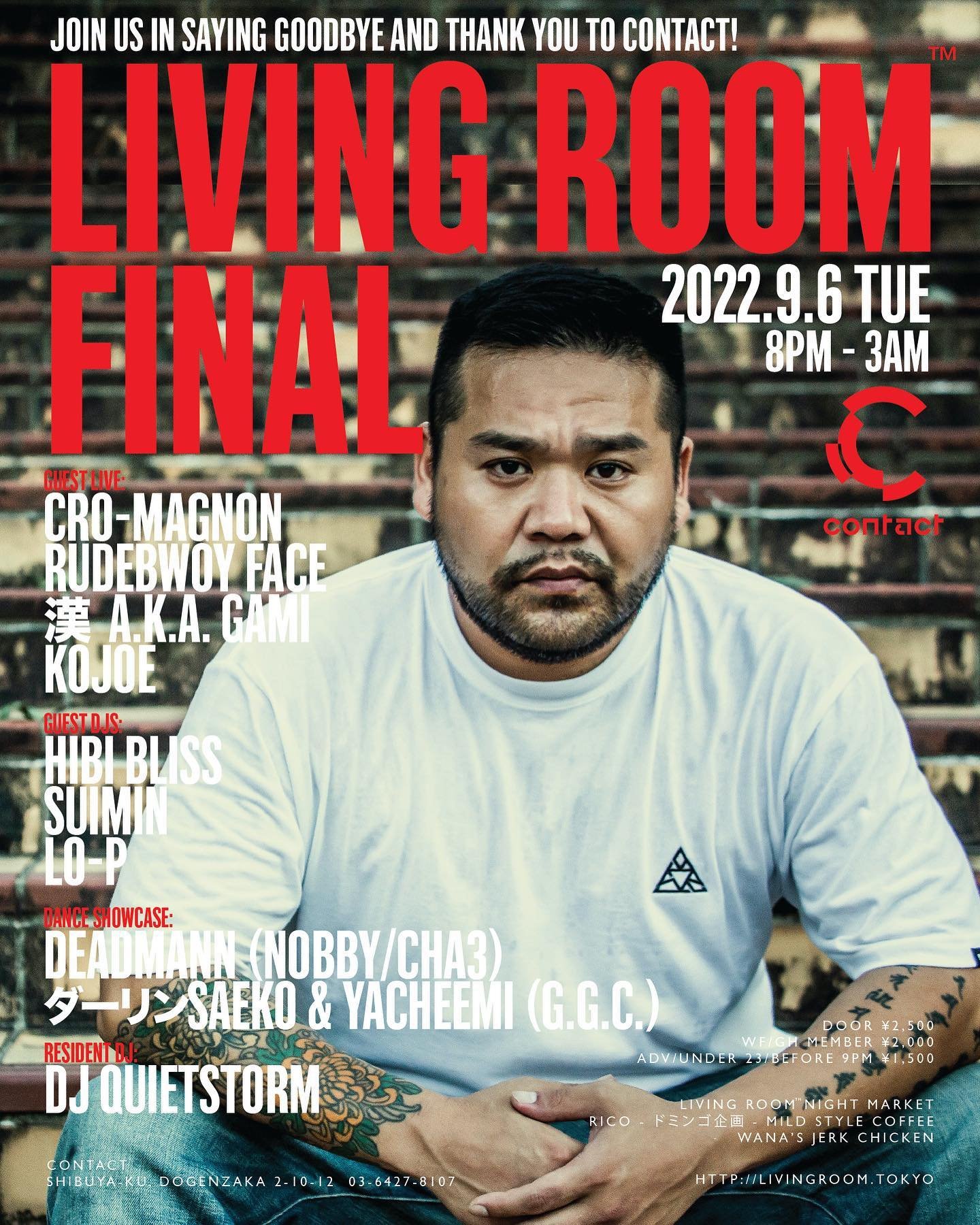
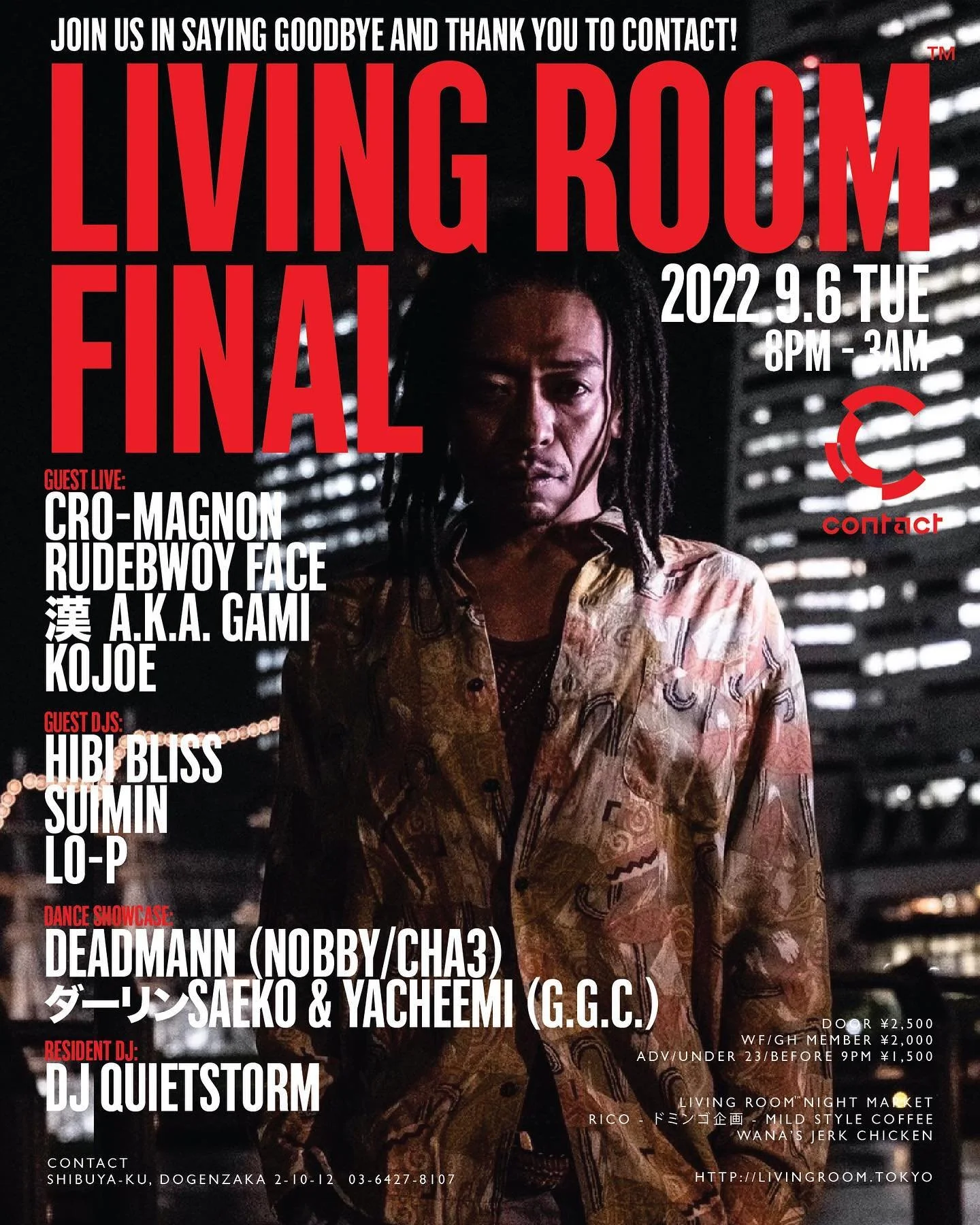
Do you have any words for this generation of Tokyo creatives?
Go deep. Go underground. Find your own spot. For me 30 years ago, I didn’t know anybody who spoke English for my first few years over here, that’s how I picked up Japanese so quick. It was a tough few years but I knew I was in it for the long haul and it definitely paid off. Because once you can speak naturally, you can really start to connect to people on a different level.
I’m really excited when I make a new friend who’s just come over or who’s been on a similar path that I’ve been on, I think there are a lot of super cool people here and I can’t wait to see what we can contribute to this amazing city’s culture. Let’s get it!
Do you have any last words?
It’s an honor to be in the Sabukaru community.
Thank you so much for your time today!
Interview & text by Casey Takumi Omori
Images via DJ Queitstorm Instagram [photographer credits in captions]




